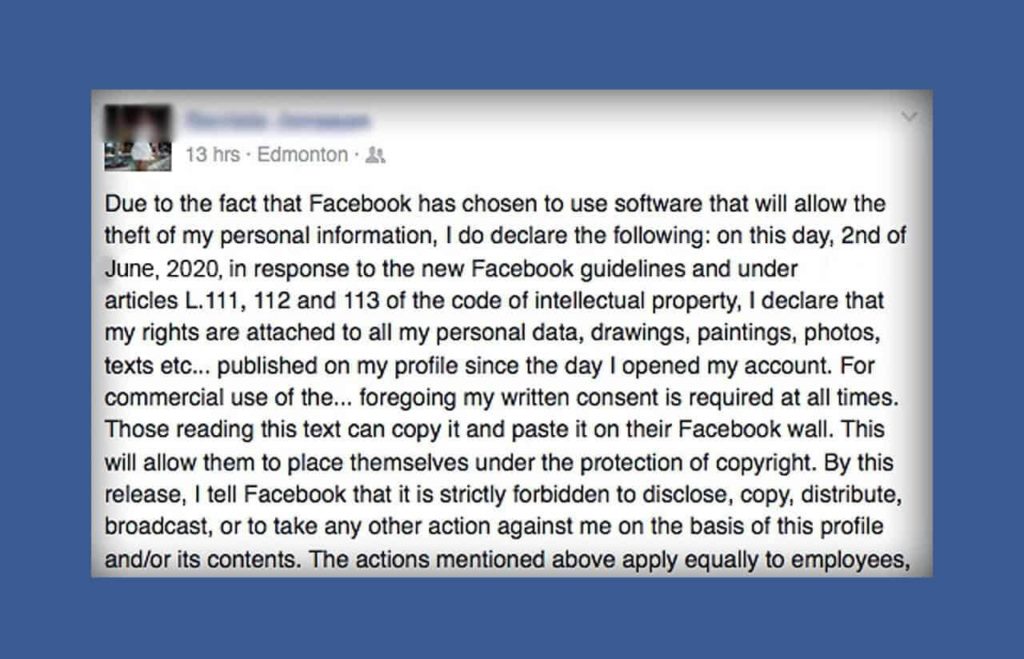Facebook Copyright Protection Hoax: How It Works
A “Facebook Copyright Protection” hoax is making its rounds on Facebook again after the rumors that the social media platform will roll out an update on its privacy controls. Tens of thousands of users are posting it to their profiles, not knowing it is a fake, but claiming their rights to individual property. Essentially, it is a “copy and paste” technical message that users do not comprehend entirely. It is just another annoying recurring hoax, which many people still choose to believe.
There are a few versions of the “Declaration,” and they are similar to another hoax pulled in the past, wthen was about the Facebook's Privacy Policy. How does the scam work?
Scam Detectors Most Trusted Websites in Online Security
- Guard.io (100): Surf the web safely. Clean up your browser, remove maliscious extensions and check for privacy violations.
- Incogni.com (100): Delete your personal data from the internet and protect against scams and identity theft.
- ExpressVPN (100) Stay secure and anonymous online - Best VPN Out There
This is the one this year:
- “Because Facebook has chosen to use software that will allow the theft of my personal information, I do declare the following: on this day, 2nd of June, 2020, in response to the new Facebook guidelines and under articles L.111, 112 and 113 of the code of the intellectual property, I declare that my rights are attached to all my personal data, drawings, paintings, photos, texts, etc… published on my profile since the day I opened my account. For commercial use of the… foregoing my written consent is required at all times.
- Those reading this text can copy it and paste it on their Facebook wall. This will allow them to place themselves under the protection of copyright. By this release, I tell Facebook that it is strictly forbidden to disclose, copy, distribute, broadcast, or take any other action against me based on this profile and/or its contents. The actions mentioned above apply equally to employees, students, agents, and/or other staff under Facebook's direction.
- The contents of my profile include private information. The violation of my privacy is punished by the law (UCC 1 1-308 – 308 1 -103 and the Rome Statute). Facebook is now an open capital entity. All members are invited to post a notice of this kind, or you can copy and paste this version if you prefer. If you have not published this statement at least once, you will tacitly allow the use of elements such as your photos as well as the information contained in your profile update.“
Posting a declaration like this on your profile doesn't do absolutely anything. If you remember (if you did read the fine print) when you agreed to the terms, you accepted how Facebook uses and shares your personal information. Signing up for a Facebook account means that you've already decided to abide by the legal terms of the company's Statement of Rights and Responsibilities. Facebook agrees that users retain copyright to everything posted on Facebook while reserving a “license to use and display that content.” You don't need to reassert your intellectual property rights, because you already affirmed them when you signed up for Facebook.
The agreement you signed virtually grants Facebook the “non-exclusive, transferable, sub-licensable, royalty-free, worldwide license to use any IP content that you post on or in connection with Facebook (IP License).” In other words, as long as a post or photo remains on Facebook, the company has the right to use it commercially, and most definitely do not need to seek your “written consent.” Parties to an agreement can't subsequently dictate their own terms.
Watch the video below to see an explanation of the Facebook Copyright Hoax:
How to Avoid the Facebook Copyright Protection Hoax
This is another reminder that anything you post on social media becomes public information. That's why it is called “social” and “media”. If you really want something to be confidential, then posting it online is not the brightest idea. Don't post that declaration on Facebook anymore.
How to protect yourself more:
If you want to be the first to find out the most notorious scams every week, feel free to subscribe to the Scam Detector newsletter here. You'll receive periodical emails and we promise not to spam. Last but not least, use the Comments section below to expose other scammers.
Verify a website below
Are you just about to make a purchase online? See if the website is legit with our validator:
vldtr®


TOP 4 MUST-WATCH FRAUD PREVENTION VIDEOS
1. Top 5 Amazon Scams in 2024 2. Top 5 PayPal Scams in 2024 3. How To Spot a Scam Email in 2024
- Latest Posts by Selma Hrynchuk
-
Compromised Credit Card Scam
- -
Fake Google Chrome Update
- -
Facebook Privacy Notice Hoax
- All Posts













